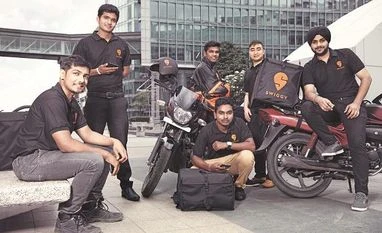Take the example of Madhu Kumar. Kumar, who hails from Mysuru, was working with Swiggy in Bengaluru when his mother had to undergo surgery back at home. The food delivery start-up helped him relocate to Mysuru and offered him a job there. Similarly, Flipkart accommodated Satish Mahale — who was earlier working in Bengaluru — into its newly introduced ‘City Logistics’ cluster in Karwar, his hometown.
Mahale needed to return to Karwar as his father was seriously ill and undergoing treatment.
Kumar and Mahale are just the two of hundreds of such workers and delivery partners employed with online commerce firms who are now able to find the same kind of job avenues closer to their hometowns.
Even many workers employed in other industries in metro cities, such as Bengaluru, Mumbai and Delhi, are returning home to work with e-commerce and food-tech companies for a better quality of life and affordable cost of living.
“Now that Swiggy is rapidly expanding across the country, we’re noticing a nice trend where delivery partners, who have been with us in the metros for over two-three years, are opting to return to their hometowns to manage our operations there,” said Srivats T S, vice president-marketing, Swiggy. “Over the past year, hundreds of our delivery partners have moved back to their hometowns because of Swiggy’s presence there.”
Naspers-backed Swiggy, which has a fleet of around 200,000 active delivery partners across 200 cities, is rapidly expanding its footprint and is launching its services in one new city or town in almost every two days. In a city like Bengaluru, the earning potential for a food-delivery partner at Swiggy is about Rs 25,000- Rs 30,000 per month, according to sources. In smaller towns, it about Rs 20,000 per month but the cost of living there is much cheaper, reverse-migration has become an attractive option.
“The sector is now ripe to tap into the potential in non-metros, with most smaller cities reeling from undersupply of organised retail and restaurants,” said Madhur Singhal, managing director, Praxis Global Alliance, a management consulting and advisory firm that specialises in e-commerce and consumer internet. “This has created opportunities for food-tech and e-commerce companies for rapid growth and create employment opportunities of various forms in the non-metros. Zomato and Swiggy (which are present in these cities) are creating options for people to settle back in their hometowns,” Singhal added. Walmart-owned Flipkart, too, is observing this trend of reverse migration. According to the e-commerce major, there is an increased economic opportunity in tier-II and tier-III towns because of the expansion of e-commerce, as well as growth of sellers and domestic manufacturers.
“As we help drive e-commerce adoption to the next 200 million customers and more people join us from tier-II and III towns, we are committed to providing opportunities that make our people grow. This growth also helps relatively uniform urbanisation and to an extent reverse migration from cities,” said Rajneesh Kumar, chief corporate affairs officer, Flipkart.
When the US-based retail giant Walmart acquired Flipkart for $16 billion last year, it was estimated that this deal alone would create 10 million direct and indirect jobs in the country over a period of 10 years.
Food-delivery company Zomato, which is backed by investors such as Alibaba's Ant Financial, Sequoia, and Glade Brook Capital Partners, is also launching its services in around 50 new cities every month. The Gurugram-based firm said it is not just expanding the food-delivery and restaurant ecosystem but also creating jobs, especially in smaller cities where such opportunities were earlier limited. The company has over 200,000 partners across more than 300 cities in the country, 54 per cent of whom are located in tier-II and tier-III cities. This figure stood at 12 per cent in September 2018.
The scope of food delivery is also increasing with partners choosing to ride bicycles (and e-bikes), “a trend primarily witnessed in smaller cities", said a Zomato spokesperson. Compared to motorbikes, the maintenance cost for bicycles is negligible and there is no requirement of holding a driving licence either, which in turn, increase their “employment feasibility, as well as earning potential,” the spokesperson added. On how food delivery is creating an entirely new market in India, Zomato recently cited in a report that 70 per cent of the company’s regular users in Kolhapur had never tried food delivery (even over a phone call) before they started using its platform.
To read the full story, Subscribe Now at just Rs 249 a month
Already a subscriber? Log in
Subscribe To BS Premium
₹249
Renews automatically
₹1699₹1999
Opt for auto renewal and save Rs. 300 Renews automatically
₹1999
What you get on BS Premium?
-
Unlock 30+ premium stories daily hand-picked by our editors, across devices on browser and app.
-
Pick your 5 favourite companies, get a daily email with all news updates on them.
Full access to our intuitive epaper - clip, save, share articles from any device; newspaper archives from 2006.
Preferential invites to Business Standard events.
Curated newsletters on markets, personal finance, policy & politics, start-ups, technology, and more.
Need More Information - write to us at assist@bsmail.in
)